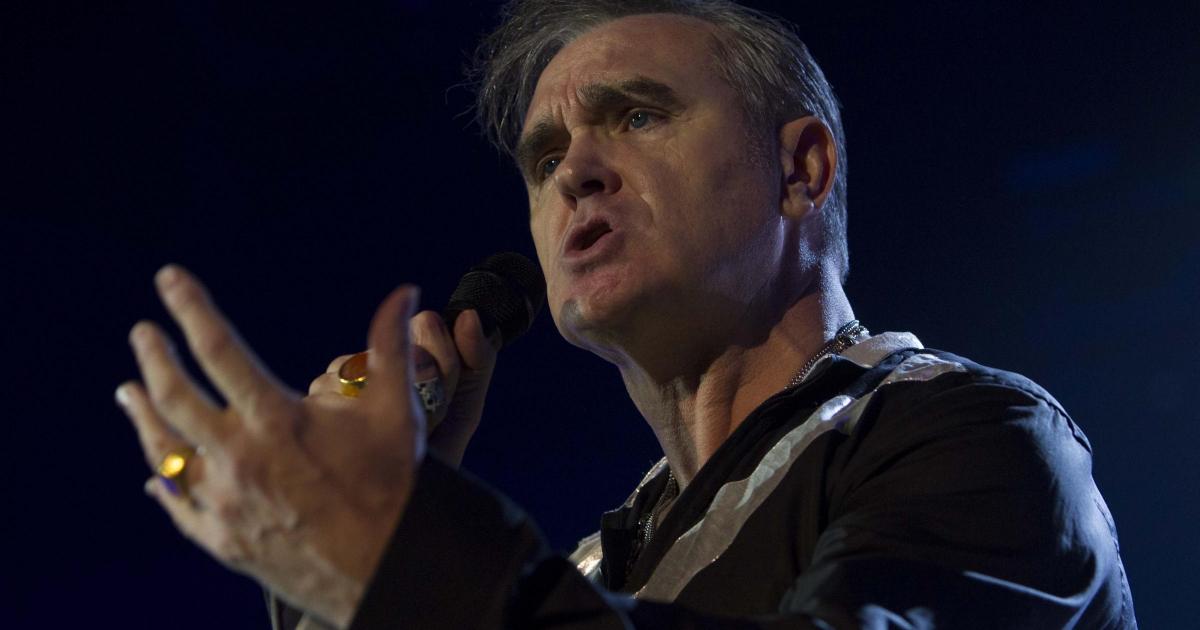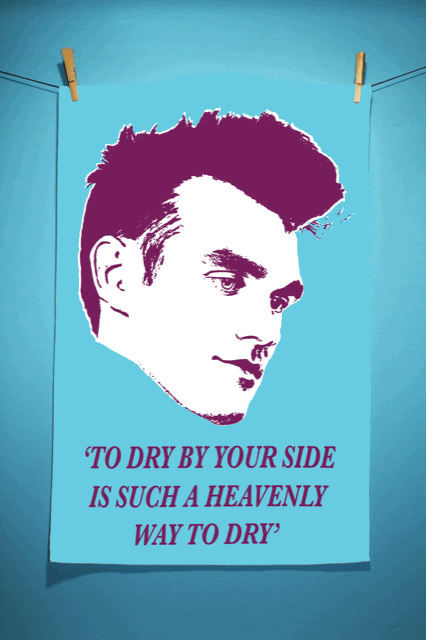Transcript:
MORRISSEY v THE SIMPSONS
Why I remain loyal to the ex-smiths singer in his feud with the home of Homer
The Herald 22 Apr 2021 Mark Smith
IS my tea towel racist? It is blue and white and has a picture of Morrissey on it and the words, “to dry by your side is a heavenly way to dry”. Yes, I know: the joke’s a bit lame, but it amused me when I spotted it in a shop, and I dry my cups and plates with it, and I think it’s quite funny really.
But I ask again: is the tea towel racist? A friend of mine spotted it when he was visiting me and asked if it was okay to have Morrissey memorabilia. Isn’t he racist? And if you’re drying the dishes with his image, doesn’t that make you racist too? It sounds silly but I know people who’ve deleted him from their playlists. Morrissey has controversial views, therefore they must never listen to his music again.
My view is: sod that, I love the music (in the words of Morrissey, it affects me in a strong and beautiful way). But if I can, I’d like to understand how the fans who’ve fallen out of love with him feel. What they seem to be saying is they stopped loving Moz when he (apparently) stopped having left-wing opinions. This certainly seems to be the view of the people who write The Simpsons. You may have seen the fuss over the episode that features a Morrissey-esque character who starts out as a cool, vegan waif but morphs into a racist, burger-munching fatty.
Morrissey himself was not amused. There is a “victimisation that automatically associates with my name,” he said, “on which The Simpsons’ episode feasts.” British journalists are also “suicidally anguished because they cannot urge the people around me to drum up tell-tale incidents of racism”. It’s typically Moz isn’t it? Dramatic, brittle, anguished, angry: most of his sentences just need a guitar and drums to be turned into lyrics.
But whose side to take? I love Morrissey. I love The Simpsons. But neither is perfect or straightforward. If you listened to Morrissey’s Margaret on a Guillotine about the imagined execution of Thatcher, did you not also listen to Bengali in Platforms on the same album? “Shelve your Western plans/and understand/ That life is hard enough when you belong here.” Both are controversial, but he’s writing about what he’s always written about: working class boys, boys who love other boys, and animals on the way to slaughter. He’s being hateful and loving at the same time, but then most of us are.
As for The Simpsons, isn’t it a bit rich for them to accuse anyone of being racist? The Indian character Apu was voiced by a white man doing a silly voice. And Groundskeeper Willie, with his shoogly eyes, ranty opinions, and bird’s-nest beard, is a grotesque stereotype of Scottish people (apart from my Uncle William to be fair). My point being: judgement works two ways, so take care how you judge.
Perhaps the other problem here is that we seem to need our heroes to be either good or bad, hero or villain, us or them. It might also help if we avoided the sledgehammer vocabulary that’s used to impose the judgements. The Simpsons’ portrayal of the older Morrissey with his belly hanging out was obviously meant to suggest “gammon” (old white person with reactionary views) but the way the word gammon focuses on skin colour and age is discomfiting and crude.
There are many other words that have the same problem: “woke”, “transphobic” and sometimes “racist” too. If used indiscriminately (which they often are), they reduce a complicated argument (and the nuanced lyrics of the former leader singer of The Smiths) to crude labels, which in turn provoke even cruder ones. Call me gammon and I will call you woke. Call me racist and I will call you racist too.
In the end, this is pretty much what The Simpsons versus Morrissey is all about: label versus label. But I must side with Morrissey. For personal reasons. Loyalty. Contrariness. Bloody-mindedness. And love of what he meant, and means. Glasgow Barrowlands. February 3, 1995. Morrissey on stage. Me in the front row. He is not the man he was then. And neither am I. And that’s fine.

 www.heraldscotland.com
https://www.pressreader.com/uk/the-herald-1130/20210422
www.heraldscotland.com
https://www.pressreader.com/uk/the-herald-1130/20210422

